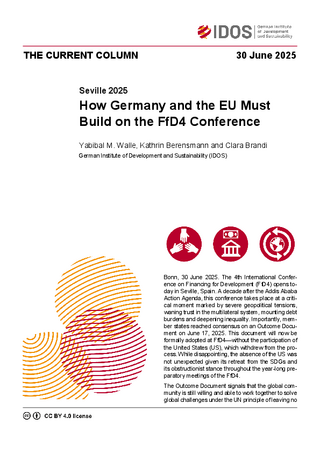Seville 2025
How Germany and the EU Must Build on the FfD4 Conference
Walle, Yabibal / Kathrin Berensmann / Clara BrandiThe Current Column (2025)
Bonn: German Institute of Development and Sustainability (IDOS), The Current Column of 30 June 2025, 2nd, revised edition
Bonn, 30 June 2025. The 4th International Conference on Financing for Development (FfD4) opens today in Seville, Spain. A decade after the Addis Ababa Action Agenda, this conference takes place at a critical moment marked by severe geopolitical tensions, waning trust in the multilateral system, mounting debt burdens and deepening inequality. Importantly, member states reached consensus on an Outcome Document on June 17, 2025. This document will now be formally adopted at FfD4—without the participation of the United States (US), which withdrew from the process. While disappointing, the absence of the US was not unexpected given its retreat from the SDGs and its obstructionist stance throughout the year-long preparatory meetings of the FfD4.
The Outcome Document signals that the global community is still willing and able to work together to solve global challenges under the UN principle of leaving no one behind. Yet, its implementation and many unresolved issues require continued attention. To facilitate this process, the organisers have created the Sevilla Platform for Action. Given their long-term bilateral and multilateral engagement, their status as leading aid providers, and their significant stakes in international financial institutions, Germany and the EU are well positioned to take the lead in turning these commitments into concrete reforms.
First, official development assistance (ODA) is a critical measure of solidarity and credibility. The FfD4 document reaffirms the commitment to the long-standing target of 0.7% of GNI for ODA, but without enforceable timelines. Germany and the EU should strive to fulfil this commitment by publicly committing to interim milestones. Moreover, it is also vital that at least 0.15 to 0.2% of GNI goes to Least Developed Countries (LDCs), as the document states. This is particularly crucial at a time when recent data has demonstrated a significant decline in ODA to Sub-Saharan African countries.
Second, the Outcome Document acknowledges the need for reform of the IMF and World Bank but avoids binding language. Given that the US has veto power in both institutions, any major reforms will need to find the approval of the US government. Being important stakeholders, Germany and the EU should be drivers of negotiation in this regard. For example, they should advocate for a capital increase in the upcoming World Bank shareholding review and support concrete steps toward fairer representation of developing countries. Meanwhile, the EU Commission should ask the European Central Bank (ECB) to lift its opposition to channelling Special Drawing Rights (SDRs) via development banks.
Third, the Outcome Document recognises the severity of the debt crisis and offers several good, even innovative proposals. In 2023, 54 developing countries — almost half of which African — had net interest payments amounting to over 10 per cent of their government revenue. Introduced at the end of 2020, the G20 Common Framework for Debt Treatments is currently the only existing framework for comprehensive debt restructuring, including debt cancellation for poor countries. Germany and the EU should push for improved coordination of creditors and greater transparency regarding debt situations and contracts. In the same vein, EU member states should agree on a roadmap for establishing universal principles of sovereign lending and borrowing, in order to prevent and resolve sovereign debt crises more effectively.
Fourth, the Outcome Document has rightly placed substantial emphasis on increasing domestic resource mobilisation and directing private capital flows in a way that reflects both urgency and fairness. Accordingly, Germany and the EU should increase bilateral support for tax administration reform, digitalisation and anti-corruption efforts in developing countries. Domestic efforts must be complemented by strengthened international cooperation to combat illicit financial flows. In this regard, one of the most encouraging outcomes of the FfD4 is its political support for the UN Framework Convention on International Tax Cooperation, albeit without the US. Germany and the EU should now engage actively and constructively in the negotiations.
Fifth, noting that financial markets are not sufficiently aligned with sustainability objectives, the Outcome Document emphasises the need for country-led and country-specific sustainable finance regulations. At the same time, it calls for ensuring the international interoperability of the regulations. As capacity building for developing countries in this area is being considered, Germany and the EU should promote establishing a multilateral trust fund under an International Financial Institution to support the design and implementation of sustainable finance strategies in developing countries.
The Outcome Document of FfD4 will not only impact national and international policies towards mobilising financing for sustainable development. Its adoption and subsequent implementation are also crucial for maintaining trust in global cooperation. The Seville Outcome Document shows that a broad international consensus is still possible—even without U.S. participation. Germany and the EU should now back up words with action, such as clear implementation strategies, sustained funding, and active leadership in the Sevilla Platform for Action and related follow-up processes.




